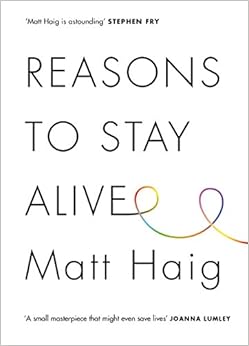Reasons to Stay Alive – Matt Haig
As previously mentioned, any reviews that aren’t of a
fictional story book won’t follow my usual layout.
Author: Matt Haig
Publisher: Canongate
Books
First published: 2015
Cover: Hardback
with dust cover
Pages: 264
Blurb: Aged
24, Matt Haig’s world caved in. He could see no way to go on living. This is
the true story of how he came through crisis, triumphed over an illness that
almost destroyed him and learned to live again.
A moving, funny and joyous
exploration of how to live better, love better and feel more alive, Reasons to Stay Alive is more than a
memoir. It is a book about making the most of your time on earth.
History of my copy: For Christmas, I received
a £10 Waterstones gift card from my friend. Last week, I finally decided to use
it towards an order of three books, Reasons
to Stay Alive being one of them.
I had heard of this book through Goodreads, and saw that it
was Waterstones non-fiction book of the month. This, along with the fact that I
suffer from depression and anxiety, pushed me to buy it. And I don’t regret it
at all. This is one of the best books I have ever read and, if you were to read
only one book in your entire life, I would recommend this one.
It’s written by Matt Haig as he looks back on the darkest
time of his life. He doesn’t dance around the issue of mental health, but
delves straight in. It’s relatable and humorous, and it truly amazes me how he
can put words to how it feels. Explaining your depression-riddled mind to
anyone who has no idea what it’s like is impossible, and I even find it
difficult to explain things to those unfortunate people who have suffered too,
so, to me, it’s an outstanding achievement to be able to publish a book about
it!
Matt Haig is an inspiration. He has shown that depression isn’t
the end of it all, and that there is a life after it. He has also helped me
feel much less alone, as many of the things he wrote about are exactly how I feel
right now. He addresses the ‘difficult’ topic well, and discusses how, despite
how common it is, and how deadly depression can be, there is still so much
negative stigma surrounding it. I know I’m certainly not the first to feel like
a disappointment for how my brain works.
Furthermore, the chapter regarding the things people say to
depressives but not in other life-threatening situations really does say it
all. As a student currently in my final year of a-levels, I am under a lot of
pressure to get better and get my attendance back up to scratch. However,
having had depression for years, I can’t cure myself and the medication doesn’t
work, so I’m stuck on the waiting list for therapy. Yet, I am still expected to
get better right now, despite the fact I haven’t had successful treatment.
Family and friends are finally starting to realise, along with my favourite
saying ‘you wouldn’t expect a patient needing a lung transplant to get better
whilst still being on the waiting list and never receiving the transplant’,
that this isn’t something I will immediately snap out of.
To read or not to
read: Read. This book is a compulsory
read for everyone. If you suffer from depression and/or anxiety, it really
helps you feel so much less alone. If you don’t suffer, it can help you
understand those who are just a little bit more.
If anyone would like to talk to me about depression or any mental illnesses at any point, whether you're at your lowest, or just want to know more, please feel free to leave a comment and I'll get in contact with you.

No comments:
Post a Comment